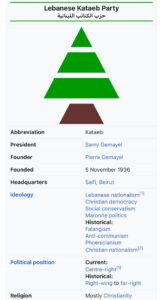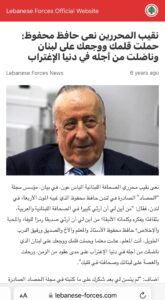Labour Councillor Bassam Mahfouz is anti Palestinian with links to Lebanese Kataeb Party who committed Sabra and Shatila Massacre
Recent scrutiny has been directed at Labour Councillor Bassam Mahfouz in Ealing Southall due to his perceived silence regarding Israeli war crimes in Gaza. In Southall, activists have rallied the Arab and Palestinian community to denounce Bassam Mahfouz’s role with the Labour Party, as well as his alleged connections with certain Israeli lobby groups operating within the party.

To understand who is Councillor Bassam Mahfouz we take you a flashback to the history of his family and his father, Bassam Salim Mahfouz the Journalist and poet whose writings praised Lebanese Kataeb Party which slaughtered Palestinian refugees in 1982 in what was known as “Sabra and Shatila Massacre”

Recently Lebanese Kataeb Party lebanese-forces.com mourned the death of Bassam’s father Mr Hafez Salim Mahfouz
Lebanese Kataeb Party said “The dean of the editors of the Lebanese press, Elias Aoun, in a statement, mourned the founder of the magazine “Al-Hassad” published in London, Hafez Mahfouz, who died Wednesday in London, and said: “Where can I lay a big man in the Lebanese and Arab press, his culture, idea and his elegant words? Where can I lay a friend a symbol of fulfillment, love and sincerity? Hafez Mahfouz, the professor, the teacher, brother, the friend and the companion of the long path, you are the teacher, you lived as a teacher and carried your pen and pain on Lebanon, for which you fought in the world of alienation for decades, and you left and the twig on your Lebanon and its press in your heart.”

He added: “I have not yet been able to thank you for what I wrote in the London-based harvest magazine, about my new book, ‘God’s regret for Israel’s creation… as for the regret of the West.’ My brother Hafez, and this most beloved word to my heart and your heart, which has only been beaten with love and sincerity, I will not say goodbye to you, but to goodbye, you are the most loyal and sincere people.”
He continued: “The deceased was the editor of many Lebanese and Arab newspapers and magazines in Lebanon and London, the most prominent of which were “accidents” and “The Sayad”, and founded in the United Kingdom a successful magazine, “The Harvest”. May God have mercy on him.”
What is Sabra and Shatila massacre?
The Sabra and Shatila massacre stands as one of the darkest chapters in Lebanon’s history, a harrowing testament to the horrors of sectarian violence and political manipulation. The massacre was conducted jointly by Israeli army and Lebanese Kataeb Party.
The right-wing Christian militia, Phalange Party has coordinated with Israeli army a full attack against Palestinian refugees in sabra and Shatila camp with the help of many Christian families.
At the heart of this tragedy lies the sinister involvement of the Gemayel family, whose patriarch played a pivotal role in orchestrating the brutal assault on Palestinian refugees.In September 1982, following the assassination of Lebanese President-elect Bashir Gemayel, Christian Phalangist militiamen, under the leadership of Elie Hobeika, stormed the Sabra and Shatila refugee camps in Beirut. What ensued was a massacre of unprecedented scale, with innocent men, women, and children slaughtered in cold blood over the course of three days.Central to this atrocity was the Gemayel family, particularly their patriarch, Fadi Gemayel.
Fadi Gemayel, a prominent figure within the Christian Lebanese Forces, harbored deep-seated animosity towards the Palestinian refugees residing in the camps. Blaming them for Lebanon’s woes, he saw the massacre as an opportunity to exact revenge and assert dominance.Fadi Gemayel’s son, Jamil Gemayel, played a key role in leading the assault on Sabra and Shatila.
Under his command, Phalangist fighters descended upon the camps with a ferocity that defied humanity, leaving a trail of devastation and despair in their wake.
The Gemayel family’s influence extended beyond mere participation in the massacre; they actively supplied weapons and support to other Lebanese families, urging them to join in the bloodshed against the Palestinian refugees.The aftermath of the massacre sent shockwaves across the world, igniting international outrage and condemnation. While the exact death toll remains disputed, with estimates ranging from hundreds to thousands, the collective trauma inflicted upon the survivors endures as an indelible scar on Lebanon’s collective consciousness.In the decades since the massacre, the Gemayel family has faced limited accountability for their role in the atrocities committed at Sabra and Shatila.
Despite calls for justice and investigations, political maneuvering and entrenched sectarianism have shielded them from facing the full consequences of their actions.The legacy of the Sabra and Shatila massacre serves as a stark reminder of the dangers of unchecked power, sectarian hatred, and political exploitation. It is a testament to the enduring pain and suffering inflicted upon innocent civilians in the pursuit of misguided ideologies and agendas.
As Lebanon continues to grapple with its tumultuous past and uncertain future, the memory of those who perished in the massacre must not fade into oblivion. It is incumbent upon us to honor their memory by seeking truth, justice, and reconciliation, and ensuring that such atrocities never happen again.
Mahfouz Family at the heart of Right-wing Christian militia, Phalange Party
Amidst the chaos of the Sabra and Shatila massacre, the Mahfouz family also played a significant role in the violence against Palestinian refugees. With a fervent allegiance to the Christian Lebanese Forces, members of the Mahfouz family actively participated in the assault, further fueling the bloodshed and carnage. Alongside the Gemayel family, numerous Christian families heeded the call to arms, wielding weapons and executing the orders of their commanders without question. This collective complicity underscores the systemic nature of the violence perpetrated against the Palestinian refugees, highlighting the deep-seated sectarian tensions and political machinations that engulfed Lebanon during this tumultuous period.
The tragedy of Sabra and Shatila stands as a stark reminder of the devastating consequences wrought by the collusion of power, ideology, and unchecked violence.
According to Lebanese archives at the time of civil war, Mahfouz family was heavily armed and funded by the Gemayel family like all other right wing Christian families.
Labour Councillor Bassam Mahfouz was subject to recent criticism in Ealing Southal for being silent on the Israeli war crimes in Gaza.
Activists in Southall urged the Arab and Palestinian community to condemn Bassam Mahfouz for being part of the Labour Party and some Israeli lobby groups within the party.

